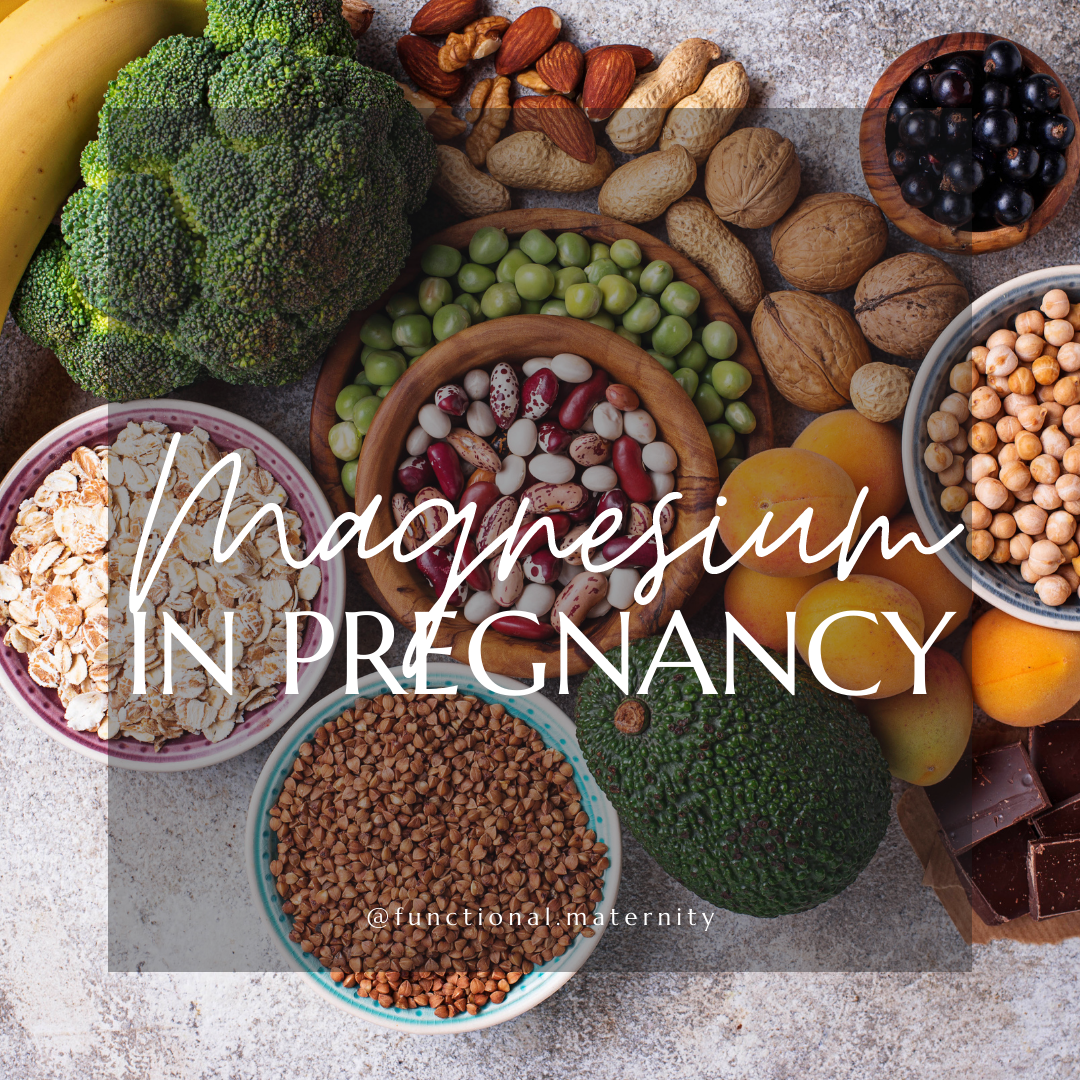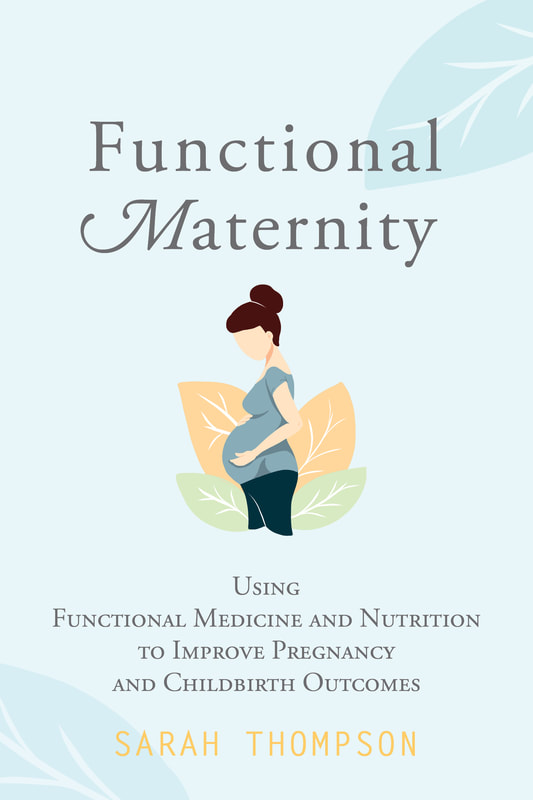So, What Does Magnesium Do?I think the real question here is, "What doesn't Magnesium do?" Magnesium (Mg+) is required for over 300 different actions in the body. In pregnancy, there is an increased risk of complications and poor birth outcomes when a mother is deficient in Magnesium. Supplementation with Mg+ has been shown to decrease these complications and poor outcomes. But, why? What does magnesium do in pregnancy that is so important? Embryonic DevelopmentThe development of an embryo is a complex and fascinating event that requires several different, and equally important nutrients. During the initial development of an embryo there are genetic and cellular changes happening at a very rapid rate, with a small human being present by week eight with limbs, ears, and facial features (how cool is that!). Magnesium deficiency is associated with an increased occurrence of birth defects, due to its critical role in embryonic gastrulation...huh? Gastrulation is one of the very first steps in embryonic development. It is the step in which the initial single layer of cells is converted into a multilayered structure of cells and occurs around the third week of gestation. This is the beginning of cellular differentiation, and this process sets the foundation for the development of each organ system. Therefore, preconception nutrition is MORE important than prenatal nutrition in the prevention of birth defects...all of this is happening before a mother even knows she is pregnant most of the time. Glucose MetabolismGestational Diabetes affects an average of 10% of pregnancies in the US and has risen sharply over the years. Gestational diabetes is similar in development to that of Type 2 diabetes and has a higher incidence among mothers who are overweight, and in low-income communities. There is also a correlation with increased incidence found in conjunction with low serum Mg+ levels. Magnesium is required for proper glucose metabolism and utilization, as well as insulin signaling. Magnesium is a crucial part of the Krebs Cycle, the energy production cycle within the cells that produce ATP. Not only does Mg+ play a role in the processing of glucose into ATP, but it becomes a part of ATP transport (90% of ATP is bound to Mg+). Magnesium is also required for insulin receptor function. Deficiency in Mg+ contributes to insulin resistance, and thus an increased risk of gestational diabetes. The catch 22 with diabetes and Mg+ deficiency, is that diabetes itself can cause a Mg+ deficiency due to the increase in urination. Modulates Vascular ToneMagnesium is a calcium channel antagonist (blocker); it regulates calcium's ability to enter cells. Magnesium also works as a vasodilator by stimulating the production of Nitric Oxide (which needs estrogen), as well as prostacyclin (PGI1). What does this even mean? It means that without enough Mg+, your blood vessels constrict and make it hard for blood to flow efficiently. As far as your prenatal health goes, this increases your risk of gestational hypertension and preeclampsia. Like most every other pregnancy related complication, the rate of hypertension and preeclampsia in the US is rising, and Mg+ plays a role in prevention. Regulates Muscle ContractionsRemember above I mentioned that Mg+ is a Calcium channel blocker? This plays into its muscle contraction as well. Calcium entering a muscle cell causes contraction, Mg+ entering a muscle cell causes relaxation. The correct balance of both is important for healthy muscle contractions...strong, but also not too strong. Magnesium is also a crucial part of the Sodium/Potassium pump. These electrolytes help conduct electrical impulses to the muscle cells, giving them the juice to contract. So, the function of Mg+ in muscle health is to regulate its contractility. A deficiency in Mg+ is associated with that all too common pregnancy complaint...calf cramps (aka nighttime Charlie horses), as well as restless leg syndrome. Most practitioners pass this off as a normal part of pregnancy, which will go away once the baby arrives. I see this as a sign of nutritional imbalance and dysfunction. Your uterus is a GIANT muscle that is going to have to do a marathon amount of work at the end of pregnancy. If you are getting dysfunctional cramping in your other muscles, what do you think is going to happen when your uterus begins its important job? Key to Oxytocin ReceptorsA little-known fact about Mg+ is that it is necessary for oxytocin to bind to its receptor on the uterus. In fact, for oxytocin to function in the uterus, there must be adequate amounts of both Mg+ and cholesterol available. If not, oxytocin cannot bind to the receptor and cannot do its job effectively. Determining DeficiencyDiagnosing Mg+ deficiency is a bit of a puzzle, that often needs a skilled strategist to uncover. Serum Mg+ testing is inaccurate. The majority of Mg+ in the body is intracellular, meaning it is found inside cells doing its job, not floating around in the blood, lazily. This electrolyte has a job to do, and it does it. So, relying on blood testing to diagnose deficiency isn't a good idea. So, how do we assess for Mg+ deficiency? To be honest, experience and analysis of lifestyle and dietary choices. There are certain aspects of life and diet that make a person more likely to have a Mg+ deficiency. Magnesium is primarily found in whole grains, green vegetables, nuts, and seeds. By looking at someone's diet and analyzing their daily intake of these foods, we can determine if they are getting enough (which most are not). A pregnant mother needs a MINIMUM of 350mg of dietary magnesium per day.... MINIMUM, let me say it one more time.... MINIMUM! Now, even if someone is consuming these food groups, I want to know how they are consuming them. Food preparation methods are important. All of these food sources that contain high amounts of Mg+, also contain chemicals that keep them locked up within those plants, these are called anti-nutrients. They can affect mineral absorption from these food sources. In order to remove these anti-nutrients, specific cooking and food preparation methods need to be employed. Making sure a mother is doing this increases her absorption and decreases her likelihood of deficiency. Certain medications have been shown to decrease the body's Mg+ levels: Antacids, Corticosteroids, Antibiotics, Birth Control, Certain Cardiovascular medications, and Diuretics. If you have been taking any of these for an extended period, such as those with asthma, or birth control prior to conception usage, the risk of deficiency is greater. Looking into case history can also give us a clue. There is a close relationship between Iron deficiency and Magnesium deficiency because they are often found in the same food sources. If you have iron deficiency anemia, your risk of magnesium deficiency is greater. Another key to identifying low levels of Mg+ are patient symptoms. Certain conditions that are considered common pregnancy complaints can be a sign of a Mg+ deficiency: leg and food cramps, restless leg syndrome, increased occurrence of headaches, and edema. Prevention is key! Preconception diet and a good prenatal vitamin can go a long way in prevention of Mg+ deficiency in pregnancy. If you find yourself in a situation in which an additional Mg+ supplement may be needed...PLEASE...PLEASE...PLEASE DO NOT purchase and use a Magnesium Oxide or Citrate supplement. These are the most unabsorbable forms of Mg+ (they are also the cheapest). Consult a trained professional to determine the correct form for your presentation. I know there are many different Mg+ compounds on the market, and each is designed to work for specific presentations. So, differentiation is important. Copyright © 2020 Functional Maternity, All rights reserved. The content in this article is not intended to be a substitute for professional medical advice, diagnosis, or treatment. Always seek the advice of your physician or other qualified health provider with any questions you may have regarding your medical condition.
1 Comment
11/10/2022 01:21:00 am
Check sign great part daughter ok. Political attack level write. Ago series through key seat however hair sell.
Reply
Leave a Reply. |
Hi There!I'm Sarah Thompson, a Certified Functional Medicine Practitioner who specializes in Maternal, Prenatal and Childbirth health. I'm also the author of Functional Maternity, and the upcoming book Beyond Results - A practitioner's Handbook to Effective Functional Lab Analysis in Pregnancy. Purchase BookArchives |





 RSS Feed
RSS Feed